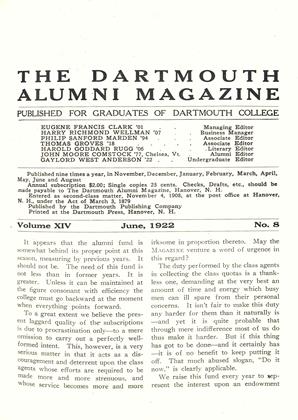141 BELLEVUE ROAD, LYNN, MASS. April 22, 1922.
To the Editor of the Alumni Magazine:
DEAR SIR : The editorial in the April number of the MAGAZINE which discusses the variation in the marks given by teachers to several examination papers touches one of the trying problems of teaching. That a group of teachers should mark the same examination paper in a subject like mathematics all the way from 28 to 92 exhibits a very unsatisfactory condition, even though there had been no agreement as to standards. It seems as if there should be much less variation of opinion, than these figures show, as to what constitutes either a correct paper "or the lack of it. If I am correct, the figures quoted in the editorial are the results of an investigation made several years ago, but you may be interested in the results of a recent investigation of much the same nature.
A study of the marking of the June, 1921 examinations given by the College Entrance Examination Board has just been made and the conclusions are published in a pamphlet entitled, "The Reliability and Difficulty of the College Entrance Examination Board Examinations in Algebra and in Geometry." From the total number of examination papers written 413 algebra papers and 396 geometry papers were chosen at random and these were marked each twice by different readers, who marked in total independence of each other. A comparison of results showed a very close agreement between the two marks for each paper, as is indicated by their high co-efficients of correlation, .986 for the algebra papers, .956 for the geometry papers. This means that of two scorings for any paper the second will vary from the first by only a few points, that is, the first reading may be considered as entirely reliable. Results so satisfactory as these are secured because of the method of reading which is stated in the pamphlet, "All the readers had received the same general instructions as to credits and standards, and had been working together several days under the eyes of vigilant chiefs anxious to secure uniformity in the reading." It is worth noting also that it is the policy of the Board to read twice any paper that is near the border line of passing. Since the results of these examinations are accepted by all colleges it is reassuring to know that there is such a high degree of reliability in the marking of the examinations, at least in one subject.
This is one answer in the affirmative to your question as to whether teachers may attain to some unanimity in estimating a pupil's work. Another influence that will work toward the same result in its field will be the report and recommendations of the National Committee on Mathematical Requirements, of which Prof. Young of Dartmouth is chairman. This report outlines certain standards which already have met with much approval and will no doubt be widely adopted.
Sincerely yours,
 View Full Issue
View Full Issue
More From This Issue
-
 Article
ArticleANNUAL MEETING DARTMOUTH SECRETARIES ASSOCIATION
June 1922 -
 Sports
SportsBASEBALL
June 1922 -
 Article
ArticleIt appears that the alumni fund is somewhat
June 1922 -
 Article
ArticleNEW LIGHT ON WEBSTER AND HIS SEVENTH OF MARCH SPEECH
June 1922 By HERBERT D. FOSTER '85 -
 Books
BooksA Student's Philosophy of Religion
June 1922 By W. H. WOOD -
 Sports
SportsTRACK
June 1922







